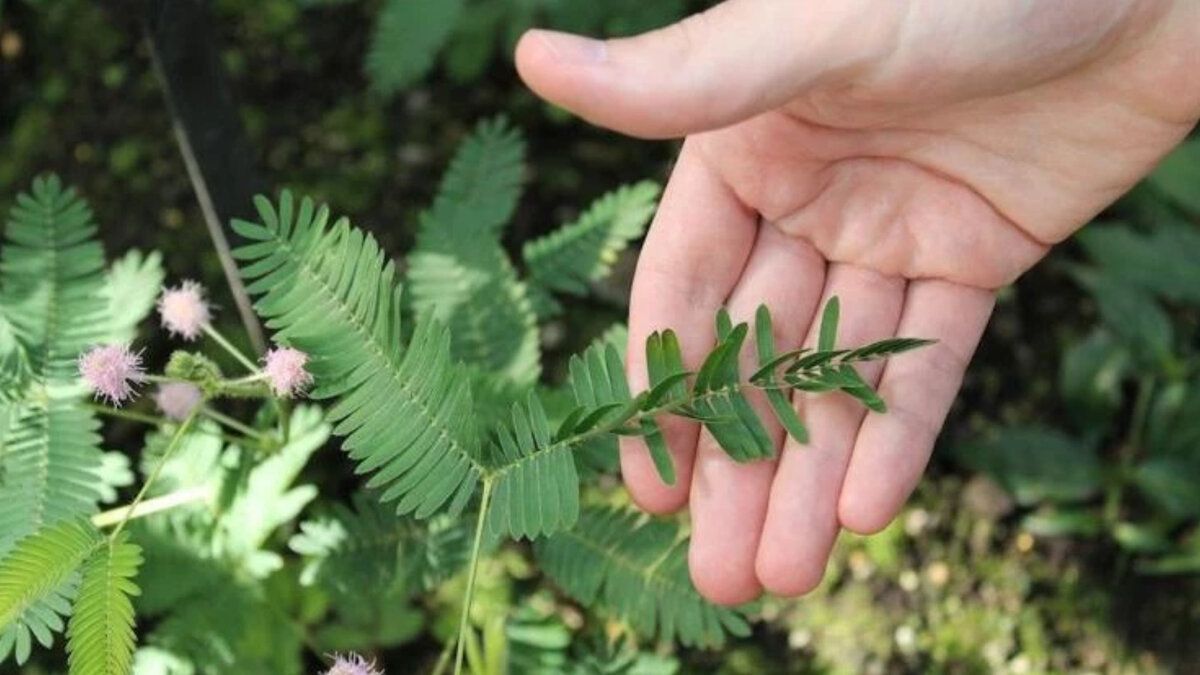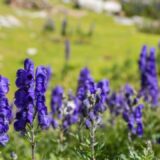Lajwanti Plant: An Ancient Herbal Wonder for Health and Beauty
The Lajwanti plant, scientifically known as Mimosa Pudica in English, is a member of the Fabaceae family. Originally native to South and Central America, this perennial herb has since spread to diverse tropical and subtropical regions across the globe. Its defining features include fern-like leaves and charming pink or purple-colored fluffy flower heads.
Mimosa Pudica is a fascinating botanical wonder, known for its unique thigmonastic response. When touched, its leaves display an intriguing behavior, folding inward and drooping, a remarkable adaptation that has earned it the nickname “Sensitive Plant.” This sensitivity to touch serves as a natural defense mechanism against potential threats in its environment.
Due to its striking appearance and captivating behavior, the Lajwanti plant has become a popular choice for botanical enthusiasts and gardeners. Its delicate foliage and vibrant blossoms make it an attractive addition to gardens, greenhouses, and indoor plant collections. Additionally, the plant’s easy cultivation and adaptability have further contributed to its widespread popularity.
Lajwanti Plant in Ayurvedic Medicine
In the world of Ayurvedic medicine, the Lajwanti plant, scientifically known as Mimosa Pudica, holds a special place due to its diverse therapeutic properties and historical significance. Ayurveda, the ancient holistic healing system of India, considers Lajwanti as a valuable herb with a wide range of health benefits.
According to Ayurvedic principles, Lajwanti is classified as having “Tikta” (bitter) and “Kashaya” (astringent) tastes. It is believed to have cooling energy, making it particularly beneficial for balancing the “Pitta” dosha, which is associated with heat and inflammation in the body. By helping to pacify Pitta, Lajwanti contributes to overall balance and harmony within the body.
The plant is traditionally used in Ayurveda to address various health issues, and its different parts, such as leaves, roots, and seeds, are utilized in diverse Ayurvedic formulations. Some of the notable uses of Lajwanti in Ayurvedic medicine include:
1. Digestive Health: Lajwanti is considered beneficial for the digestive system. Its bitter and astringent properties are thought to support healthy digestion, relieve indigestion, and soothe gastrointestinal discomfort.
2. Skin Care: The herb is utilized in Ayurvedic skincare formulations for its potential to improve skin health. It is believed to help alleviate skin conditions like acne, rashes, and itching, promoting a clear and healthy complexion.
3. Wound Healing: Lajwanti is used in Ayurvedic remedies for its potential to aid in wound healing. Its astringent properties are believed to help contract tissues and promote faster recovery.
4. Anti-inflammatory Actions: The plant’s anti-inflammatory properties are highly valued in Ayurvedic medicine. It is believed to help reduce inflammation and swelling in various parts of the body.
5. Immune System Support: Lajwanti is considered an immune system booster in Ayurveda. It is believed to help strengthen the body’s natural defense mechanisms, making it more resilient to infections and diseases.
6. Respiratory Health: In Ayurvedic practices, Lajwanti is used to support respiratory health. It is believed to help soothe irritation in the respiratory tract and promote clear breathing.
Medicinal Benefits of Lajwanti (Mimosa Pudica)
Lajwanti, also known as Mimosa Pudica, is a remarkable plant with a host of medicinal benefits that have been recognized and utilized for centuries in traditional medicine.
Its diverse therapeutic properties make it a valuable herb in addressing various health concerns. Let’s explore some of the key medicinal benefits of Lajwanti:
1. Digestive Health
Lajwanti is highly regarded for its positive effects on the digestive system. It is believed to help relieve indigestion, bloating, and gastrointestinal discomfort. The herb’s bitter and astringent properties may aid in stimulating digestion and promoting healthy bowel movements.
2. Anti-inflammatory Actions
One of the notable benefits of Lajwanti is its anti-inflammatory properties. It is often used to alleviate inflammation and swelling in different parts of the body. This makes it beneficial for managing conditions like arthritis, joint pain, and inflammatory skin conditions.
3. Wound Healing
Lajwanti has been traditionally used for wound healing. Its astringent nature is believed to help contract tissues and promote the natural healing process of wounds and cuts.
4. Skin Care
In skin care, Lajwanti is highly valued for its potential to improve skin health. Its antimicrobial and anti-inflammatory properties may help in managing acne, eczema, and other skin irritations, leading to a clearer and healthier complexion.
5. Immune System Support
Lajwanti is considered an immune system booster. Its bioactive compounds are believed to enhance the body’s natural defense mechanisms, making it more resilient to infections and illnesses.
6. Respiratory Health
Ayurvedic practitioners often use Lajwanti to support respiratory health. It is believed to help soothe respiratory irritations and promote clearer breathing.
7. Antimicrobial Activities
Studies have shown that Lajwanti exhibits antimicrobial properties, inhibiting the growth of certain bacteria and fungi. This makes it potentially useful in combating infections.
8. Gastrointestinal Disorders
Lajwanti is believed to offer relief from various gastrointestinal disorders like diarrhea and irritable bowel syndrome (IBS). Its ability to soothe the digestive tract may contribute to its efficacy in managing these conditions.
9. Antioxidant Protection
The plant is rich in antioxidants, such as flavonoids and phenols, which help neutralize harmful free radicals in the body. By reducing oxidative stress, Lajwanti supports overall health and may help in preventing chronic diseases.
10. Nervous System Support
Some traditional practices use Lajwanti to support the nervous system. It is believed to have a calming effect and may help reduce stress and anxiety.
Traditional and Modern Uses
Ayurvedic Practices
In Ayurveda, Lajwanti is incorporated into formulations to address diverse health issues, including digestive disorders, respiratory problems, and joint pain. It is often used in combination with other herbs for optimal results.
Contemporary Herbal Medicine
With the resurgence of interest in traditional medicine, Lajwanti has found its way into modern herbal remedies and supplements. Its adaptogenic properties make it a valuable addition to wellness practices.
Cosmetics and Skincare Products
The beauty industry has also recognized the potential of Lajwanti in skincare products. Its gentle yet effective properties make it suitable for various skincare formulations, catering to consumers seeking natural alternatives.
Scientific Studies and Findings
Modern research has delved into the biological compounds present in the Lajwanti plant, revealing a treasure trove of phytochemicals with potential health benefits.
Its leaves and roots are rich sources of antioxidants, flavonoids, alkaloids, and tannins, which contribute to its medicinal properties.
These bioactive compounds play a crucial role in scavenging harmful free radicals, reducing inflammation, and supporting overall well-being.
1. Antimicrobial Activities
Research has demonstrated that Lajwanti exhibits potent antimicrobial properties, effectively inhibiting the growth of certain bacteria and fungi.
This exciting finding suggests the plant’s potential in combating infections and offers a natural and sustainable alternative to traditional antimicrobial agents.
2. Wound Healing Properties
Studies have highlighted the Lajwanti plant’s remarkable ability to accelerate wound healing. Its anti-inflammatory and antioxidant characteristics play a crucial role in promoting tissue regeneration and reducing the overall healing time.
This natural wound-healing prowess makes Lajwanti a valuable asset in traditional medicine and wound care.
3. Antidiabetic Potential
Preliminary research suggests that Lajwanti may hold promise in managing blood sugar levels, potentially serving as a valuable adjunct to conventional diabetes management.
While these findings are promising, further comprehensive studies are essential to validate the plant’s potential as an antidiabetic agent.
4. Antimicrobial Potential
Furthermore, studies have explored the plant’s antimicrobial properties, suggesting its potential in combating certain bacteria and fungi.
The Lajwanti plant’s ability to fend off harmful microorganisms opens up exciting possibilities for natural and sustainable alternatives in various health applications.
5. Diabetes Management
Additionally, preliminary investigations indicate that Mimosa Pudica may have anti-diabetic properties, making it an area of interest in diabetes management research.
The potential role of the Lajwanti plant in supporting blood sugar regulation adds to its allure as a medicinal herb with multifaceted benefits.
Precautions and Side Effects
While Lajwanti (Mimosa Pudica) offers numerous medicinal benefits, it is essential to be aware of potential precautions and side effects when using this herb.
As with any herbal remedy, individual responses may vary, and it is crucial to exercise caution and consult a qualified healthcare professional before incorporating Lajwanti into your healthcare routine. Here are some important considerations:
1. Allergic Reactions: Some individuals may be sensitive or allergic to Lajwanti. If you experience any allergic reactions, such as skin rashes, itching, or respiratory discomfort, discontinue use immediately and seek medical attention.
2. Pregnancy and Breastfeeding: Pregnant or breastfeeding women should avoid using Lajwanti without consulting their healthcare provider. The herb’s effects on pregnancy and lactation have not been extensively studied, and it is best to err on the side of caution.
3. Interaction with Medications: Lajwanti may interact with certain medications, including blood pressure medications, anticoagulants, and diabetes medications. If you are taking any prescription drugs, it is vital to seek medical advice before using Lajwanti to prevent potential interactions.
4. Gastrointestinal Discomfort: While Lajwanti is traditionally used to support digestive health, some individuals may experience gastrointestinal discomfort or upset when using the herb. If you experience any digestive issues, reduce the dosage or discontinue use.
5. Excessive Use: Like any herbal remedy, excessive use of Lajwanti may lead to adverse effects. Always follow recommended dosages and guidelines provided by healthcare professionals or product manufacturers.
6. Children and Infants: The safety of using Lajwanti in young children and infants has not been well-established. It is best to avoid using the herb in this population without proper medical guidance.
7. Surgery: If you are scheduled for surgery, it is crucial to inform your healthcare provider about any herbal supplements or remedies, including Lajwanti, that you are taking. Some herbs may interact with anesthesia or other medications used during surgery.
8. Quality and Purity: When purchasing Lajwanti supplements or products, ensure that they are sourced from reputable and trusted manufacturers. Quality and purity are essential to ensure the effectiveness and safety of the product.
Incorporating Lajwanti into Daily Life
Lajwanti Tea Recipe: A simple way to enjoy the benefits of Lajwanti is by brewing a nourishing tea. Boil dried leaves in water for a few minutes, strain, and enjoy its earthy goodness.
DIY Skincare: Experiment with Lajwanti in homemade skincare recipes like face masks or serums to unlock its potential in revitalizing your skin.
Conclusion
The Lajwanti plant, with its remarkable sensitivity and potent medicinal properties, continues to captivate the world with its historical significance and modern-day applications.
From traditional Ayurvedic practices to contemporary herbal medicine and skincare products, this herbal wonder offers a wealth of benefits for health and beauty enthusiasts alike.
FAQs (Frequently Asked Questions) on Lajwanti plant
1. What are the common names of Lajwanti in different cultures?
In India, it is often called “Touch-me-not” due to its sensitivity to touch. In different regions, it may be known by various vernacular names.
2. How does the Sensitive Plant react to touch?
When touched, the leaves of the Lajwanti plant fold inward and droop as a defense mechanism against potential threats.
3. Can Lajwanti help with hair growth?
While Lajwanti is not directly linked to hair growth, its antioxidant properties may contribute to a healthy scalp environment, supporting overall hair health.
4. Is Lajwanti safe for pregnant women?
Pregnant women should consult their healthcare provider before using Lajwanti or any herbal remedies to ensure safety during pregnancy.
5. Where can I purchase Lajwanti-based products?
Lajwanti-based products can often be found in health food stores, online herbal shops, and specialty skincare retailers.
References
- THE ANTIMICROBIAL ACTIVITY OF MIMOSA PUDICA L.(1)
- Evaluation of wound healing activity of root of Mimosa pudica(2)
- Mimosa pudica alleviates streptozotocin-induced diabetes, glycemic stress and glutathione depletion in Wistar Albino Rats(3)
- In Vitro Antioxidant and Antimicrobial Potency of Mimosa pudica of Nepalese Terai Region: Insight into L-Mimosine as an Antibacterial Agent(4)
- Weeds as Alternative Useful Medicinal Source: Mimosa pudica Linn. on Diabetes Mellitus and its Complications(5)
Lajwanti, or Mimosa Pudica, is a prized herb in Ayurvedic medicine, treasured for its multifaceted medicinal properties. From supporting digestive health to promoting radiant skin, this ancient plant continues to play a vital role in traditional Ayurvedic remedies aimed at achieving holistic well-being.


























